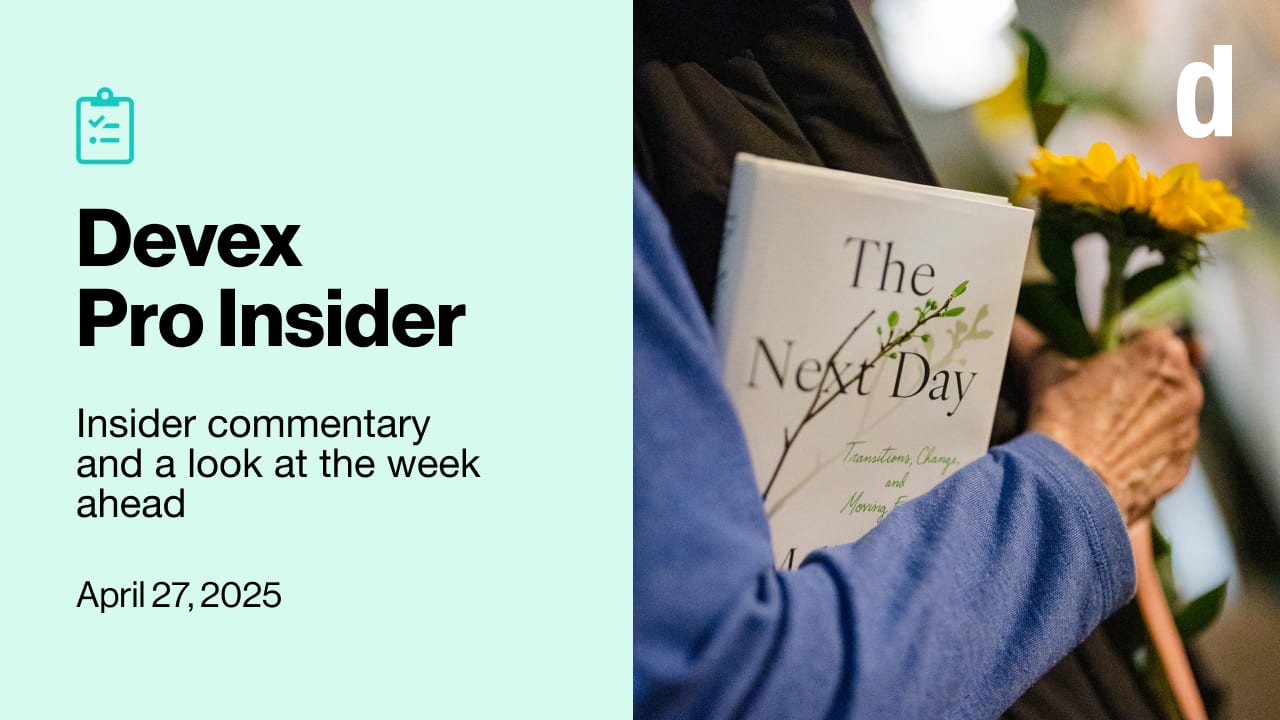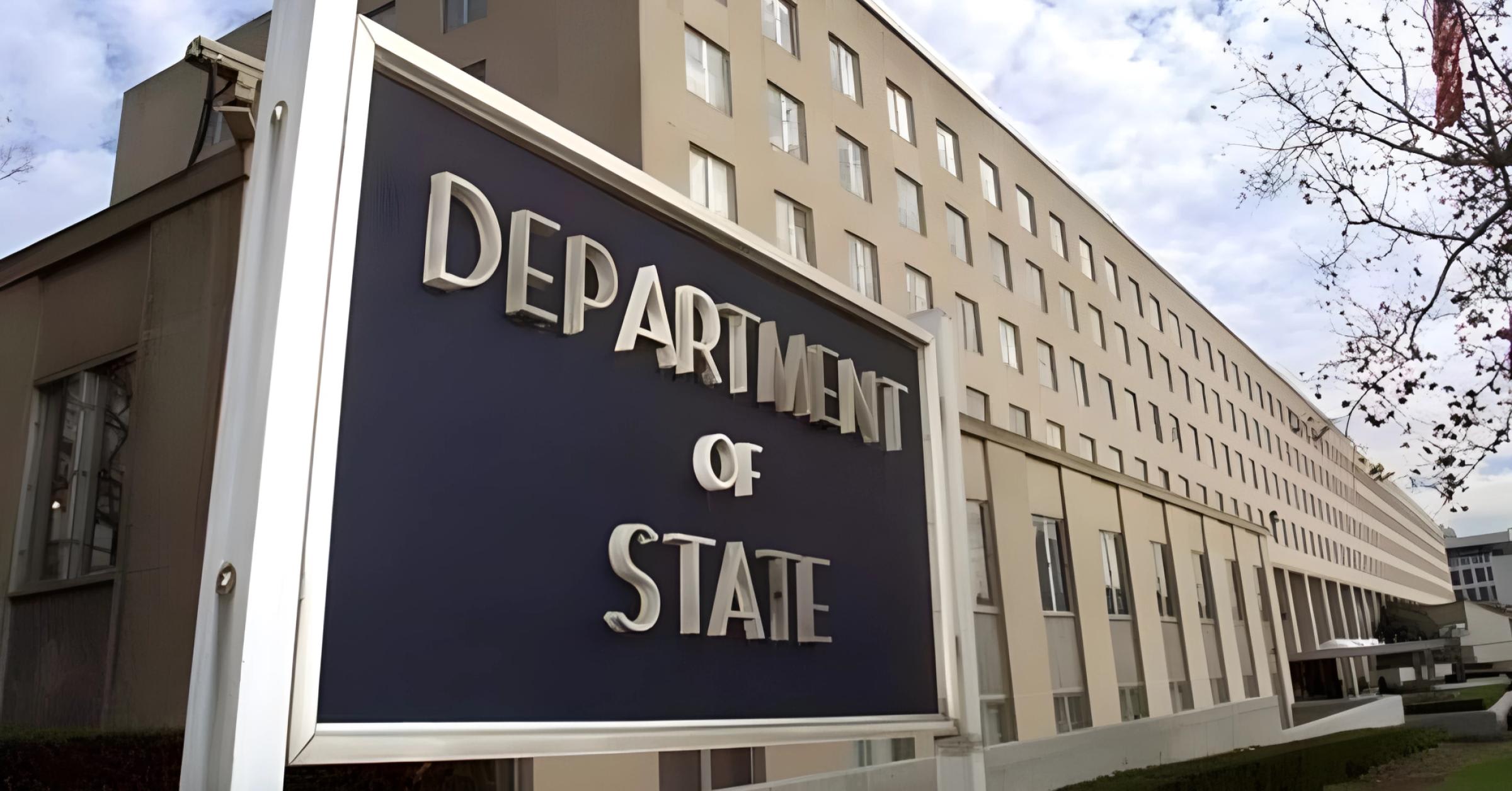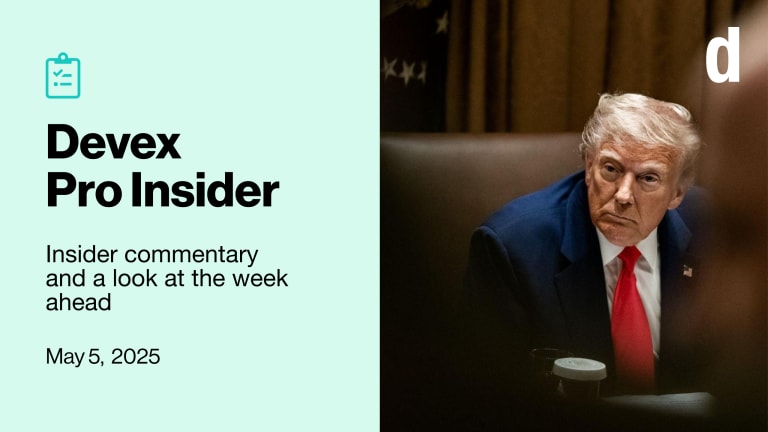Devex Pro Insider: COP29 chaos, and Skoll dreams of Mars colonization
Countries walk away from COP29; Trump starts making appointments; and DAI's Afghan relocation success.
We’re entering the main week of the 29th U.N. Climate Change Conference, or COP29, in Azerbaijan and the smell of oil is literally in the air. It’s not been plain sailing so far. One small island developing state called it quits before the event even began, describing it as “a total waste of time,” with nothing but “empty promises and inaction, while our people suffer the devastating consequences of climate change.” And then Argentina walked away three days into the conference — without stating a reason, but amid reports that the country’s climate-skeptic president, Javier Milei, is considering pulling out of the Paris Agreement alongside U.S. President-elect Donald Trump. Meanwhile, France canceled its ministerial presence at COP29 after Azerbaijan's president accused it of human rights violations in its overseas territories. If you want to know what it feels like on the ground, we have two reporters in Baku who will be keeping you posted. And if you want a heads up on the key issues to watch, we’ve also got that for you. Coming up: Join us for the next Devex Pro event where we’ll be hearing unique insights into how to win more business with USAID. Also in today’s edition: Trump’s appointments, DAI’s Afghan relocations, UNICEF’s first climate chief, and Jeff Skoll’s U-turn. Bits and pieces Team Trump. Since Trump was reelected as U.S. president earlier this month, he’s been moving quickly to make key political appointments. The first one with strong relevance for the development community was Elise Stefanik, who was named U.S. ambassador to the U.N., a position once held by current USAID Administrator Samantha Power. Stefanik is a staunch defender of Trump’s “America First” agenda and has also fiercely backed Israel in its war on Gaza. She’ll presumably bring both those causes to her platform at the U.N. There’s some concern that such a big job is going to someone with little foreign policy experience. However, experts who spoke to my colleague Colum Lynch described her as an astute political player and “probably among the more competent Cabinet picks that we’ll see from the Trump administration.” And amid concerns that Trump is ready to slash U.N. funding and withdraw from several agencies and agreements, some took solace from the fact that he named a U.N. ambassador so early, suggesting he sees it as an important role. Some also felt reassured by Trump’s selection of Sen. Marco Rubio for secretary of state. Rubio has a record of support for U.S. global engagement, foreign assistance programs that further economic and national security, and U.S. aid reforms aimed at diversifying development partnerships, according to my colleagues Adva Saldinger and Michael Igoe. A State Department human rights official told them they considered Rubio to be the “best of the worst” among the possible contenders. However, the selection of vaccine-skeptic Robert F. Kennedy Jr. to lead the Department of Health and Human Services wasn’t quite so encouraging … + For Pro members: What we do and don’t know about Trump’s US aid plans Speaking of which … America’s philanthropists were divided by the election. Some remained conspicuously silent but both the Soroses and the Gateses (reportedly) backed Kamala Harris. Meanwhile, Jeff Bezos — founder of the Bezos Earth Fund — caused controversy by preventing The Washington Post, which he owns, from endorsing Harris. Then there’s Jeff Skoll. The former eBay president and founder of the Skoll Foundation has donated more than $1 billion over the years, with a focus on supporting social entrepreneurs to solve global challenges. He didn’t make an official endorsement, but the day Trump was reelected, he retweeted a post from Elon Musk’s mom Maye, which read, “A great day, full of hope and happiness [heart emoji] [US flag emoji]”, and a photo of Musk (a vocal Trump supporter) saluting the stars and stripes. It’s a major U-turn for Skoll, who was one of the biggest donors to U.S. President Joe Biden’s campaign in 2020, giving a mammoth $645,000 to get him elected, according to Forbes. But these days, Skoll’s social media posts are almost exclusively about Musk, and often quite bizarre. Take this one from September where he recounted a vivid dream about a colony on Mars, which he suggested was a premonition of what Musk would achieve; or this one where he praised Musk’s “wise strategy” of “reproducing with a variety of women.” Quite aside from politics, something odd is in the air. Monopoly — but not the fun kind. Two-thirds of the people chosen to lead 10 key U.N. bodies since 2007 have been white, according to an analysis from U.N. watchers PassBlue. In fact, some of the agencies they look at — including the U.N. Development Programme and the Department of Peace Operations — have been exclusively led by white appointees for nearly two decades, according to the analysis. But even those with apparently more diverse leaderships show signs of the monopoly system that governs appointments at some U.N. agencies. For example, the World Food Programme has been led by a succession of Americans; the Department of Economic and Social Affairs has only ever had leaders from China; and the humanitarian agency OCHA has been dominated by Brits. In fact another one, Tom Fletcher, is taking over at OCHA this week, even after the Pact for the Future said that U.N. appointments must “adhere to the general rule that there should be no monopoly on senior posts in the United Nations system by nationals of any State or group of States.” But amid the frustration, let’s not forget that some big U.N. agencies are doing better. The Office of the U.N. High Commissioner for Human Rights has been led by citizens of four different countries from four different continents since 2007, for example, while the U.N. Population Fund has never had a white chief. + Related reading: The UN's big power job monopoly Long-term commitment. When the U.S. pulled out of Afghanistan in August 2021, thousands of people who had worked with Western organizations were left behind — all of whom were now vulnerable to being targeted by the Taliban. Among them were many aid workers, and although their employers went to varying lengths to get them out of the country, the process proved to be logistically and bureaucratically exhausting. But in a rare bit of good news, U.S. development contractor DAI says that three years after the withdrawal, it has now managed to relocate more than 500 of its former staff members and their families, amounting to more than 2,200 people. The organization had around 550 Afghan staffers working for it at the time of the withdrawal but made a commitment to help all former staff members who were eligible for the U.S. State Department’s special immigrant visa or P-2 refugee program, both of which were set up for Afghans. It’s been no mean feat. Within days of Kabul falling, an emergency team of DAI volunteers and temporary staff began tackling the influx of requests. It quickly became clear that a dedicated team would be needed, and the volunteers were eventually replaced by 10 full-time staffers working to vet and provide documentation for applicants, and another team of six who guided applicants through the process and helped research evacuation routes. The team continues its work today, with six full- and part-time members. Pastures new. Finally, over in Baku, my colleagues bumped into Gernot Laganda, the WFP director for climate and resilience. Turns out he’s moving to New York to become UNICEF’s first climate chief (which, incidentally, means his current job is up for grabs). His to-do list this week? Finish out COP29, submit WFP’s updated climate plan, and pack. ✉️ Do you have insights into any of this week’s bits and pieces? Let me know by replying to this email. Moving on Speaking of DAI, the organization announced that its president Tine Knott will succeed Jim Boomgard as chief executive officer from February 2025. Dennis McLaughlin was named as chief risk officer and vice president of the World Bank. He currently serves as the interim chief risk officer of Fnality Services, a blockchain-based financial services company. Leonard Zulu of Zimbabwe is the new U.N. resident coordinator in Uganda. And Katie Gottschalk is stepping down as executive director of the O’Neill Institute for National and Global Health Law at Georgetown University. Did we miss one? Is there a change on the horizon? Let us know at devexpro@devex.com. Up next G20. Brazil is president of the G20 this year and is hosting the leaders’ summit in Rio de Janeiro. Its priorities have been fighting hunger and poverty, responding to the climate crisis, and reforming global financial institutions, with advocates excited about this global south-driven agenda and some of the proposals that have been made. But with Trump now back, the big question is: How much of what’s decided will stick? My colleague Elissa Miolene has an explainer on why this G20 matters for the development community and will be bringing you more from the ground. Nov. 18-19. African Economic Conference. Organized by the African Development Bank, the Economic Commission for Africa, and the UNDP, this research-focused conference in Gaborone, Botswana, will focus on how to secure Africa’s economic future amid rising uncertainty. In particular, it will explore how global and regional uncertainty is impacting Africa’s development, practical strategies to build resilience to shocks, innovative development financing, and the role of technology. Nov. 23-25. Jobs of the week Your Devex Pro membership includes access to the world’s largest global development job board. Here are some of the latest high-level openings: • Landscape Director, Bili Mbomu Conservation Area, African Wildlife Foundation (DRC). • Director, Office of the Director-General, WHO (Switzerland). • Head of Research Finance, London School of Hygiene and Tropical Medicine (U.K.). • Vice President, Technology, Winrock International (U.S.). Search through more opportunities here.
We’re entering the main week of the 29th U.N. Climate Change Conference, or COP29, in Azerbaijan and the smell of oil is literally in the air.
It’s not been plain sailing so far. One small island developing state called it quits before the event even began, describing it as “a total waste of time,” with nothing but “empty promises and inaction, while our people suffer the devastating consequences of climate change.” And then Argentina walked away three days into the conference — without stating a reason, but amid reports that the country’s climate-skeptic president, Javier Milei, is considering pulling out of the Paris Agreement alongside U.S. President-elect Donald Trump. Meanwhile, France canceled its ministerial presence at COP29 after Azerbaijan's president accused it of human rights violations in its overseas territories.
If you want to know what it feels like on the ground, we have two reporters in Baku who will be keeping you posted. And if you want a heads up on the key issues to watch, we’ve also got that for you.
This story is forDevex Promembers
Unlock this story now with a 15-day free trial of Devex Pro.
With a Devex Pro subscription you'll get access to deeper analysis and exclusive insights from our reporters and analysts.
Start my free trialRequest a group subscription Printing articles to share with others is a breach of our terms and conditions and copyright policy. Please use the sharing options on the left side of the article. Devex Pro members may share up to 10 articles per month using the Pro share tool ( ).
Jessica Abrahams is a former editor of Devex Pro. She helped to oversee news, features, data analysis, events, and newsletters for Devex Pro members. Before that, she served as deputy news editor and as an associate editor, with a particular focus on Europe. She has also worked as a writer, researcher, and editor for Prospect magazine, The Telegraph, and Bloomberg News, among other outlets. Based in London, Jessica holds graduate degrees in journalism from City University London and in international relations from Institut Barcelona d’Estudis Internacionals.








